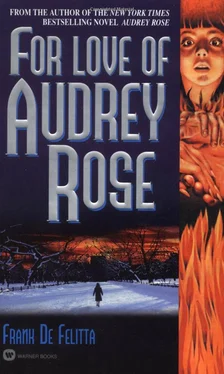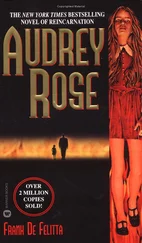She walked on. Abruptly, there was a pair of tiger posts, and then a clearing. Yellow, dry grass grew where the forest had been cleared, an island of tranquility surrounded by dense undergrowth. The yellow grass was parched, sloped upward to a small house made of forest logs tied together. Inside the hut — it had no door — was a smooth, polished floor, and it looked like burnished mahogany. There was brass, or gold, gleaming inside the hut, and a vermilion image of a deity rising from the painted flames, and next to it several ocher bowls hanging from the roof.
Next to the shrine was a second, longer house. Janice now saw men on its porch, and her heart raced violently.
They were all Hindus, their bodies short, rounded, faces down low to the ground as they conversed. They wore carmine cloth tucked up into their belts, and their hair was so greasy or pomaded that it glistened from across the empty field.
Janice desperately looked between the two buildings. There was no Hoover. A figure came from behind the long house, carrying a bucket of water. The figure was tall, his slender shoulders sloped slightly from the weight of the load. Janice gasped. As the figure turned, she saw that the face was aboriginal, flat-nosed, nearly black, and the slim limbs graceful and jet black. Two more figures came into view as Janice walked slowly toward the compound. They tended a rusted can strung over a fire by a single wire on stick supports. Neither was Elliot Hoover.
Janice took another step, left the path, and entered the compound itself, where a small gate had been erected with a small brass bell. Suddenly, one of the men tending the fire leaped to his feet and raced forward, his orange robe flying behind. He waved his arms violently at her.
“No woman!” he shouted. “No woman!”
“But I must find—”
“No! Forbidden!”
Backing away at his vehemence, Janice was appalled at the ferocity of his black pupils, the narrow slits of anger that the eyes had become. She had no doubt whatsoever that he would kill her if necessary to preserve the sanctity of the ashram.
“Elliot Hoover,” Janice called from the path where she had retreated. “An American! Is Elliot Hoover here?”
But the man only glared at her. Janice backed away farther to the edge of the forest. Satisfied, the man walked slowly back to the fire and sat down cross-legged, poking at the coals with a sharpened stick.
Janice walked back out from the path, but this time did not approach the gate with the bell. She went past it, parallel to the field of yellow grass. The man looked up from his fire but did not move. She looked from her new perspective, but saw only a single woodcutter, hacking branches from a dead tree with a primitive instrument that looked like a hoe.
“Elliot Hoover!” she called.
There was no answer. After ten minutes of standing alone, feeling ridiculous and yet determined, Janice saw a monk walking slowly toward her. His head was down, and yet his legs seemed to move in a familiar stride, direct and yet soft, as though his whole being knew exactly where he was going and how many paces it would take, and that he had all of eternity to get there.
“Elliot?” she whispered.
The monk looked up. It was a brown face, thin, the face of an ascetic. The eyes were very dark, almost black, and they seemed to look out at her with irritation.
“Why is it you have come to disturb us?” he asked calmly.
“I beg your pardon,” she stammered. “I truly am sorry….”
“What is your purpose here?” he asked in a flutelike voice that reminded her of one who took drugs, it was so otherworldly and disassociated.
“I am looking for a friend,” Janice said softly.
“Who is your friend?”
“Elliot Hoover, an American, about six feet tall, blue eyes—”
“Yes. We know Elliot Hoover very well. He is not here.”
“Not here?”
The monk sighed, as though regretting the complication of an explanation. Over his shoulder, Janice saw the other monks, oblivious of her presence, worshiping, some out in the field now, in the lotus position of trance.
“There was a subdivision among the order,” the monk said. “You must know that we believe in performing works of charity and ahimsa —that is, peace and nonviolence to all living beings.”
Janice pretended to know it with a nod.
“And you must, by now, know about the revolts to the south?”
“Revolts?”
“Yes. The North has repressed the facts. But it is very bad. This whole area has been evacuated.”
Astounded, Janice’s mouth opened. The idea of warfare was incongruous against the tranquility of the ancient forest and the sloping field of prayer.
“Then why are you still here?” she finally asked.
The monk smiled indulgently.
“The vicissitudes of material life do not concern us,” he said defiantly, looking directly into her eyes, challenging her very existence.
“But Elliot Hoover…?”
“He and several others decided to help the victims of the conflict. They left nearly a week ago.”
Janice felt weak. If she had known where he was, if she had flown straight from Tel Aviv to Mysore City and then taken the train south…
“Where? Where is he now?” she asked.
“I am sure that he is where the fighting is. And that is over the mountains.”
The monk gestured to the heavy black clouds to the south. Janice heard a deep rumble of thunder that echoed through unseen mountain valleys. She looked up. There was a sense of rain, but the forest, the path, the compound were all bone dry.
“Very bad,” the monk added sorrowfully. “When the rains come, the villages suffer disease. Disease from the floods, you understand?”
“Yes, I see. Do you expect floods?”
“There are always floods. It is the nature of things.” The monk gazed at her with compassion. “Perhaps if you go down to the village in the valley below, you can ask at the military compound. They screen everybody who goes beyond the Cauvery River. They will know where our members are.”
“Thank you. Thank you very much.”
“Do not fear the army. Do you have your passport?”
“Yes.”
“Explain to them that you come from the ashram. So they will not be suspicious. But do not fear them. They are still disciplined.”
“Thank you very much.”
“May you find your friend.”
The monk turned abruptly and walked slowly, placidly, back to the compound. The birds screamed at his departure. Janice stood alone in the shadow of the great forest, feeling utterly alone. At length she picked up her small suitcase and followed the road down into the valley. She felt more secure when it entered the main road. As she descended the slope, the forest rapidly thinned until she looked across a steep drop of dried grass to the rapid Cauvery.
Across the river was a stone bridge, buttressed by logs. A flag flew from what appeared to be a military outpost. At least there were two convoy trucks and a jeep parked in front of it. The ground was heavily plowed by the tires of the heavy trucks, as though they had only come there recently, and it was still the scene of feverish activity. But now there was no one visible. The river made a dull music against the stones of the bridge, and the logs rose and fell, banging and grating against the wires that held them.
Janice walked out from the forest. Sheep moved slowly away from her, looking for green grass. The dried pellets of manure covered the path and were impossible to avoid. Janice looked for a sign of life, but there was still no movement in the village.
A donkey suddenly brayed, a vicious, snarling laughter. Then a soldier walked around the rear of one of the convoy trucks. He stopped as soon as he saw her and bristled. He looked illiterate, his uniform was two sizes too large, and suddenly the monk’s phrase “still disciplined” came to mind. It was easy to see that military discipline was a burden barely imposed on the village mind.
Читать дальше












